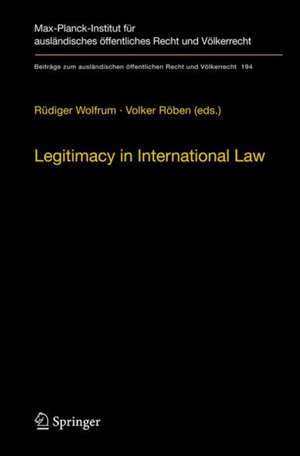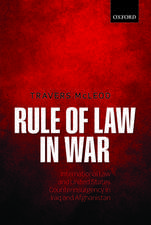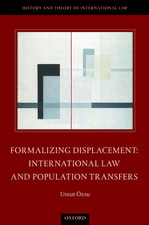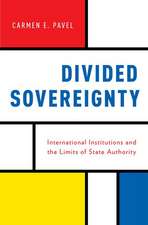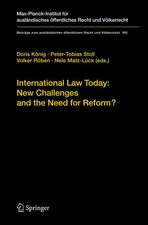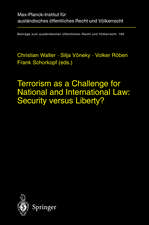Legitimacy in International Law: Beiträge zum ausländischen öffentlichen Recht und Völkerrecht, cartea 194
Editat de Rüdiger Wolfrum, Volker Röbenen Limba Engleză Hardback – 4 mar 2008
This book contains fresh perspectives on these questions, offered at an international and interdisciplinary conference hosted by the Max Planck Institute for Comparative Law and International Law.
| Toate formatele și edițiile | Preț | Express |
|---|---|---|
| Paperback (1) | 697.79 lei 6-8 săpt. | |
| Springer Berlin, Heidelberg – 30 noi 2010 | 697.79 lei 6-8 săpt. | |
| Hardback (1) | 596.87 lei 6-8 săpt. | |
| Springer Berlin, Heidelberg – 4 mar 2008 | 596.87 lei 6-8 săpt. |
Din seria Beiträge zum ausländischen öffentlichen Recht und Völkerrecht
- 15%
 Preț: 655.23 lei
Preț: 655.23 lei - 15%
 Preț: 703.16 lei
Preț: 703.16 lei -
 Preț: 403.15 lei
Preț: 403.15 lei - 23%
 Preț: 843.57 lei
Preț: 843.57 lei - 23%
 Preț: 849.36 lei
Preț: 849.36 lei -
 Preț: 504.24 lei
Preț: 504.24 lei -
 Preț: 479.03 lei
Preț: 479.03 lei -
 Preț: 383.71 lei
Preț: 383.71 lei - 15%
 Preț: 443.64 lei
Preț: 443.64 lei -
 Preț: 502.11 lei
Preț: 502.11 lei - 15%
 Preț: 443.96 lei
Preț: 443.96 lei -
 Preț: 492.96 lei
Preț: 492.96 lei -
 Preț: 488.45 lei
Preț: 488.45 lei -
 Preț: 502.49 lei
Preț: 502.49 lei - 23%
 Preț: 848.02 lei
Preț: 848.02 lei - 15%
 Preț: 453.30 lei
Preț: 453.30 lei -
 Preț: 493.47 lei
Preț: 493.47 lei - 15%
 Preț: 448.85 lei
Preț: 448.85 lei - 15%
 Preț: 452.29 lei
Preț: 452.29 lei -
 Preț: 490.18 lei
Preț: 490.18 lei - 15%
 Preț: 451.32 lei
Preț: 451.32 lei -
 Preț: 494.98 lei
Preț: 494.98 lei - 15%
 Preț: 499.86 lei
Preț: 499.86 lei - 15%
 Preț: 447.71 lei
Preț: 447.71 lei - 15%
 Preț: 469.31 lei
Preț: 469.31 lei - 23%
 Preț: 849.81 lei
Preț: 849.81 lei - 13%
 Preț: 636.06 lei
Preț: 636.06 lei - 15%
 Preț: 473.34 lei
Preț: 473.34 lei - 18%
 Preț: 858.76 lei
Preț: 858.76 lei -
 Preț: 495.58 lei
Preț: 495.58 lei -
 Preț: 408.74 lei
Preț: 408.74 lei - 15%
 Preț: 475.28 lei
Preț: 475.28 lei - 15%
 Preț: 473.99 lei
Preț: 473.99 lei -
 Preț: 512.73 lei
Preț: 512.73 lei - 15%
 Preț: 602.71 lei
Preț: 602.71 lei - 23%
 Preț: 852.03 lei
Preț: 852.03 lei - 15%
 Preț: 678.83 lei
Preț: 678.83 lei -
 Preț: 356.66 lei
Preț: 356.66 lei - 18%
 Preț: 756.82 lei
Preț: 756.82 lei - 15%
 Preț: 640.70 lei
Preț: 640.70 lei - 15%
 Preț: 588.24 lei
Preț: 588.24 lei - 18%
 Preț: 1167.51 lei
Preț: 1167.51 lei - 18%
 Preț: 830.46 lei
Preț: 830.46 lei - 15%
 Preț: 704.32 lei
Preț: 704.32 lei
Preț: 596.87 lei
Preț vechi: 702.21 lei
-15% Nou
Puncte Express: 895
Preț estimativ în valută:
114.25€ • 124.14$ • 96.03£
114.25€ • 124.14$ • 96.03£
Carte tipărită la comandă
Livrare economică 21 aprilie-05 mai
Preluare comenzi: 021 569.72.76
Specificații
ISBN-13: 9783540777632
ISBN-10: 3540777636
Pagini: 428
Ilustrații: VI, 422 p.
Dimensiuni: 155 x 235 x 33 mm
Greutate: 0.78 kg
Ediția:2008
Editura: Springer Berlin, Heidelberg
Colecția Springer
Seria Beiträge zum ausländischen öffentlichen Recht und Völkerrecht
Locul publicării:Berlin, Heidelberg, Germany
ISBN-10: 3540777636
Pagini: 428
Ilustrații: VI, 422 p.
Dimensiuni: 155 x 235 x 33 mm
Greutate: 0.78 kg
Ediția:2008
Editura: Springer Berlin, Heidelberg
Colecția Springer
Seria Beiträge zum ausländischen öffentlichen Recht und Völkerrecht
Locul publicării:Berlin, Heidelberg, Germany
Public țintă
ResearchCuprins
Legitimacy of International Law from a Legal Perspective: Some Introductory Considerations.- The Legitimacy of Global Governance Institutions.- Legitimacy of Legislative and Executive Actions of International Institutions.- On the Legitimacy of International Institutions.- Discussion Following Presentations by Rüdiger Wolfrum, Robert Keohane, Alain Pellet and Anthony D’Amato.- The Security Council as Legislator and as Executive in its Fight Against Terrorism and Against Proliferation of Weapons of Mass Destruction: The Question of Legitimacy.- The Legitimacy of United Nations Security Council Decisions in the Fight against Terrorism and the Proliferation of Weapons of Mass Destruction: Some Critical Remarks.- Discussion Following Presentations by Georges Abi-Saab and Erika de Wet.- Aspects of Legitimacy of Decisions of International Courts and Tribunals.- Aspects of Legitimacy of Decisions of International Courts and Tribunals: Comments.- Discussion Following Presentations by Tullio Treves and Rein Müllerson.- Codes of Conduct and their Implementation: the Question of Legitimacy.- Codes of Conduct and the Legitimacy of International Law.- The Concept of Legitimacy in International Law.- Discussion Following Presentations by Helen Keller, Armin von Bogdandy and Daniel Bodansky.- Legitimacy: A Problem in International Law and for International Lawyers?.- What About Hobbes? Legitimacy as a Matter of Inclusion in the Functional and Rational Exercise of International Public Power.- Construction of the Discourse on Legitimacy of International Institutions.- Round Table.
Textul de pe ultima copertă
In recent years the question of the legitimacy of international law has been discussed quite intensively. Such questions are, for example, whether international law lacks legitimacy in general; whether international law or a part of it has yielded to the facts of power; whether adherence to international legal commitments should be subordinated to self-defined national interests; whether international law or particular rules of it – such as the prohibition of the use of armed force – have lost their ability to induce compliance (compliance pull); and what is the relevance of non-enforcement or failure to obey for the legitimacy of that particular international norm?
This book contains fresh perspectives on these questions, offered at an international and interdisciplinary conference hosted by the Max Planck Institute for Comparative Law and International Law.
This book contains fresh perspectives on these questions, offered at an international and interdisciplinary conference hosted by the Max Planck Institute for Comparative Law and International Law.
Caracteristici
Includes supplementary material: sn.pub/extras
